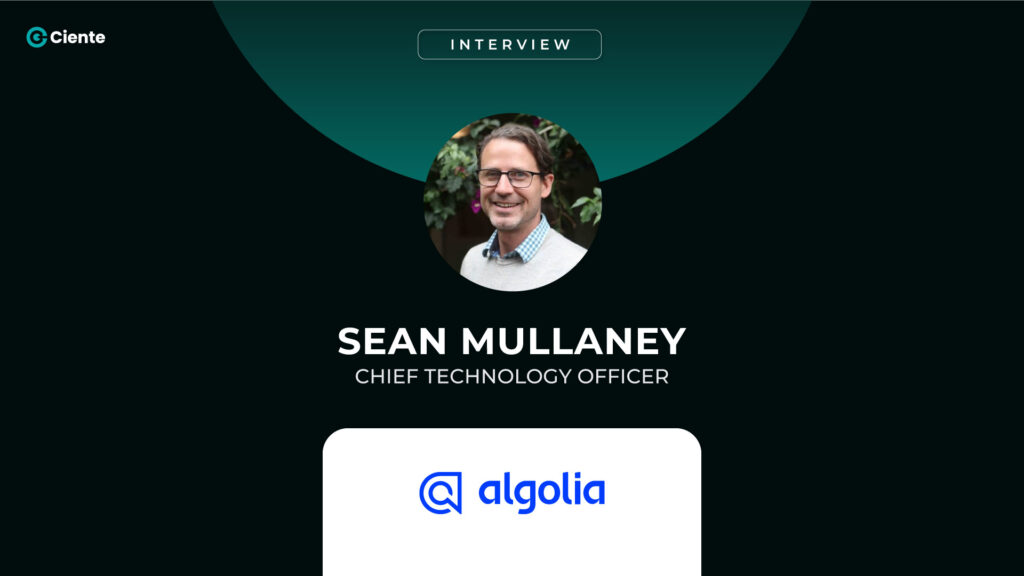Your career journey has been amazing from VP of Engineering at Zalando to CIO at Stripe to CTO at Algolia now. Could you share a bit about yourself and your career trajectory?
My professional career spans 23 years, but my interest in technology started long before that. When I was 10 years old, my parents bought our first computer, and I immediately wanted to dig into writing a text adventure game that I was copying out of a book. This kickstarted my dream of designing and building computer games, and as I entered my teenage years, I continued to explore the realm of computer science.
Fast forwarding to my career – after starting out in technical presales, I soon became an entrepreneur, founding a mobile train ticketing company and a Venture Capital boutique. Following that, I served as an executive at several disruptive tech companies, including Zalando, Stripe and Google. Throughout my career, I identified a passion for scaling best-in-class engineering organizations, developing AI-powered Search and Discovery technologies, and growing API-first solutions globally, which led me to Algolia.
Now, at Algolia, I oversee the technology behind our search engine, which is being used for over 1.75 trillion searches each year. Most recently, I led our launch of Algolia NeuralSearch –a next-generation vector and keyword search in a single API with powerful, end-to-end AI processing every query. In addition to Algolia, I angel invest in seed deals as part of the European Sequoia Scout program. As a scout, I focus most of my investments on B2B software products, like infrastructure and developer tooling, etc. – any enterprise applications that I would be interested in buying as a CTO. My current portfolio includes companies like Context, Kerno, and Zerve.
In more than seven years at Google you’ve contributed to various innovation teams. Would you like to share some experiences with us?
During my time at Google, I really got to understand how AI and other parts of business, like advertising, work. When I first joined Google, they were mobile-first – but not long after, they became an AI-first company, and this is where I got my first real experience with AI and what started my passion for this breakthrough area of technology.
More specifically, I had the chance to work on a big project, using the data we had on how advertisers used our products to help sales teams. This led to developing custom rules to predict which customers we should approach, with which products, and when – which maximized the likelihood of a salesperson bringing in the revenue they were looking for. With over 1 million advertisers on Google, this tool significantly helped the sales teams find the needles in the haystacks.
Throughout your career, your experience developing AI-powered discovery experiences is noteworthy. We would love to know more about your approaches to customer personalization.
Personalization is extremely important, especially when talking about online shopping. Many retailers have thousands, even tens of thousands, of products to offer their customers – and this can be extremely overwhelming. Our approach to personalization is bringing the human back for online shopping. We strive for our search engines to personalize experiences and put the most relevant selection of products in front of customers – just as a human would if you went into a store. Using AI to understand the large amounts of data at hand will be key in helping create positive, personalized experiences for customers.
As the CTO of Algolia, you are constantly working with AI-powered search and discovery solutions. Our audience would like to know how your team has managed to build a scalable hybrid AI search engine?
We need to spend some time discussing the history of vector search to answer this question. The idea of embedding human language into vectors has been around for decades. However, vectors’ size and computational difficulties have left the tech industry puzzled for a long time. While techniques like nearest neighbor and approximate nearest neighbor made progress in addressing these challenges, these approaches are still too slow and expensive, hindering vector scalability at enterprise-scale.
Luckily, one secret ingredient behind NeuralSearch has helped us accomplish what others haven’t, which is delivering blazing fast vector search at enterprise-scale, cost-effectively! That secret ingredient is our proprietary vectorization technique, which we’ve dubbed neural hashing. This disruptive approach allows us to compress vectors to take up 90% less space, which makes them less expensive while keeping 96% fidelity.
Now, thanks to neural hashing, NeuralSearch has become possible. It is a true industry-first, AI search platform that incorporates AI across three primary functions – query understanding, results retrieval, and ranking of results. With powerful LLMs, it allows retailers to understand the intent behind a user’s search query and deliver relevant, accurate results rather than delivering the ever-dreaded “no results” page. This turns missed opportunities into revenue at a time when it’s increasingly difficult to meet consumer expectations.
How is Algolia’s AI-powered search engine transforming the way consumers are searching for products or content?
As mentioned earlier, NeuralSearch understands the human intent behind a search query. That means it allows consumers to search as they think. Oftentimes, when we shop online, we have specific images in our minds but aren’t sure of the name of the product. Our technology allows consumers to simply describe the product they’re looking for, using conversational language, without having to play a guessing game. For example, a user can search “something to keep my drink cold,” and they’ll be shown specific products, like a stainless-steel insulated tumbler cup and koozies, even though they didn’t search the specific name of the product they were looking for. To go broader, users could also search for something like “Christmas gift for my dad” and be shown a plethora of relevant items that their dad may like as a gift – potentially a watch, giftset, cologne, etc. These conversational, long-form queries that mimic human conversations are “long tail queries,” and it’s critical that retailers can understand them because our data shows they can comprise 60-70% of all searches.
How is vectorization being used to enhance the relevance and personalization of search results for e-commerce businesses?
Search is a foundational part of the internet, with every site having a search function. The critical shift is being able to understand the enormous amounts of content and products that are online and being able to use AI to consolidate that into what’s relevant. Large language models, which are trained on extremely large corpora of human language, are used to understand the concepts behind words, encode them in a way that’s similar to concepts that are near each other in vector space, and unlock a powerful way of matching things. This helps to really understand the context and concept that the user is looking for, regardless of whether the words match. This is going to introduce a tremendously different experience in the way we search.
Search has also become a critical part of the user journey, and ecommerce is an area where you have a huge selection of products to shop from, so being able to provide personalized results will lead to several positive impacts on your business – including increased revenue.
Can you highlight the potential of Generative AI on e-commerce in the years ahead?
Generative AI is slated to make significant improvements to the ecommerce industry in the coming years, and a lot of this boils down to using natural, conversational language to efficiently search for what you’re looking for online. Before – we had to be very specific with the language we were using to search for products online, but with generative AI, we can now use terms we may not have used before and still generate a number of relevant results.
Not only will that continue to improve, but we will also see the lives of employees at these businesses improve. An example here is increased creativity. By implementing AI, we free up time for employees to tap into their impressive creativity skills and spend more time creating now that other time-consuming tasks have been eliminated from their plates. Letting employees showcase unique skills that can’t be replaced by technology, such as creativity, will have benefits all around.
Given your experience leading teams in various technology-focused roles, could you discuss the evolving role of a CTO in today’s rapidly changing technological landscape?
Just as the technology we work with, the role of a CTO will continue to evolve. While it may not seem like it now, the industry will continue to showcase innovative technologies, and we will never run into a shortage of technology to learn. Due to this, it’s critical for CTOs to learn how to not only adapt but be cross functional. As a CTO, it’s a given that you have an interest in technology – but aside from learning the ins and outs of the engineering roles on your team, it’s equally as important to understand facets of many other roles – including marketing, interacting with customers, etc. in order to be successful.
According to you, what are the core engineering and product scaling challenges startups frequently face, and how can they navigate these hurdles effectively?
One of the hardest problems that startups face is figuring out when to design their engineering to scale, and when to design it to move fast. They often make the mistake of spending too much time trying to build their first product to be a scalable system, before finding out whether customers want the product. It’s sometimes better to move fast, figure out the product market fit, and then rebuild it several times for it to be scalable and accurate. Figuring out the product market fit is also a key challenge that startups face. To combat this, they need to first start with building the product to see whether or not it’s valuable in the real world, and if customers will pay for it. They’ll also need to talk to as many customers as possible, and potentially find customers who are willing to be design partners and beta testers.
Startups tend to take a lot of shortcuts early on in their infrastructure because they don’t have a lot of customers – but doing the proper research, and really understanding the market, will save them a lot of time, and help to achieve the success they’re looking for. What is the most important piece of advice you would give to business leaders?
Being able to adapt both your product and the culture that you’re leading with every new wave of tech that emerges is key to being a successful leader. Additionally, continuing to put a focus on learning, no matter your position, is everything. Spending time learning from other individuals, reading books to sharpen your knowledge, and experimenting will be key to advancing your career as a leader.
What movie/book has inspired you recently?
Recently, I read The Soul of a New Machine by Tracy Kidder – and it inspired me because I’m able to relate to it. Set in the 1980s, engineers tell their personal stories of how they struggled for two years trying to build a new computer, and make this highly complex machine work. This resonated with me because right now, as my teams continue to work on building highly complex AI systems, we continue to go through challenging debugging phases where we try to get an AI system to work in the real world. Though this book is set in a different time period, a key lesson still stands – great things don’t come easy.
Another inspiring book that I love is The Hard Thing About Hard Things by Ben Horowitz, which I believe is one of the best leadership books out there. It’s a brutally honest book about how challenging it is to be a leader, and it’s filled with great examples of failures – which most business books don’t include. It’s important for leaders to remember that success does not come without failure.

Sean Mullaney, Chief Technology Officer, Algolia
Sean Mullaney is the Chief Technology Officer at Algolia, an end-to-end, AI-powered search and discovery platform. Most recently, he led the company’s launch of AlgoliaNeuralSearch – the world’s fastest, hyper-scalable, and cost effective vector and keyword search API.
Sean Mullaney joins Algolia from Stripe, where he most recently acted as the Chief Information Officer in Europe and led a global engineering organization overseeing the development and operations of 40+ local payment methods across Europe, Asia, and the Americas that processed hundreds of billions of dollars.
Prior to his time at Stripe, Mullaney oversaw the development of AI powered discovery experiences, including search, recommendations, personalization and browse as the VP of Engineering at Zalando, the largest eCommerce fashion retailer in Europe with nearly 50M active customers. Mullaney also spent more than seven years at Google heading various innovation teams, including three years at the Google research labs in Silicon Valley.






